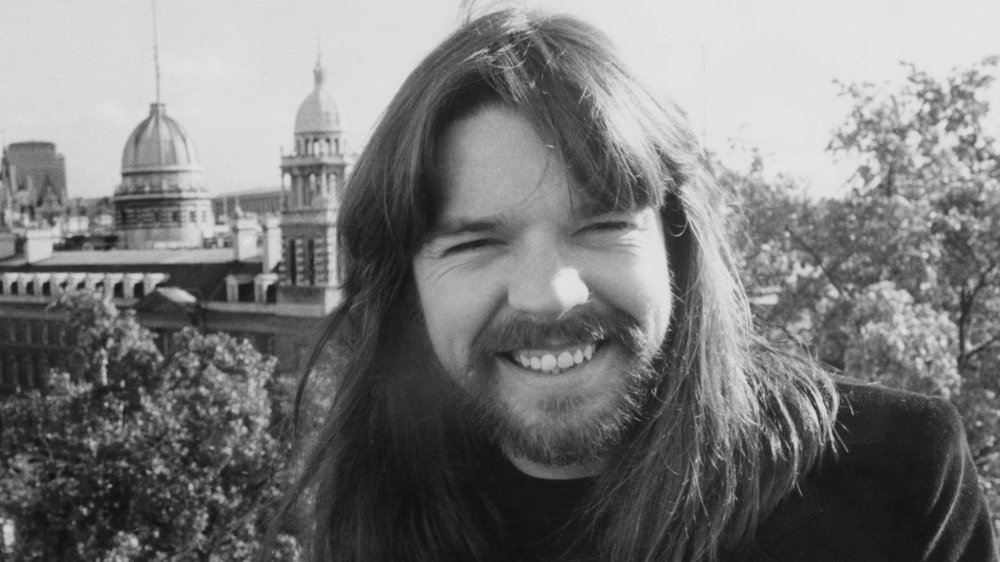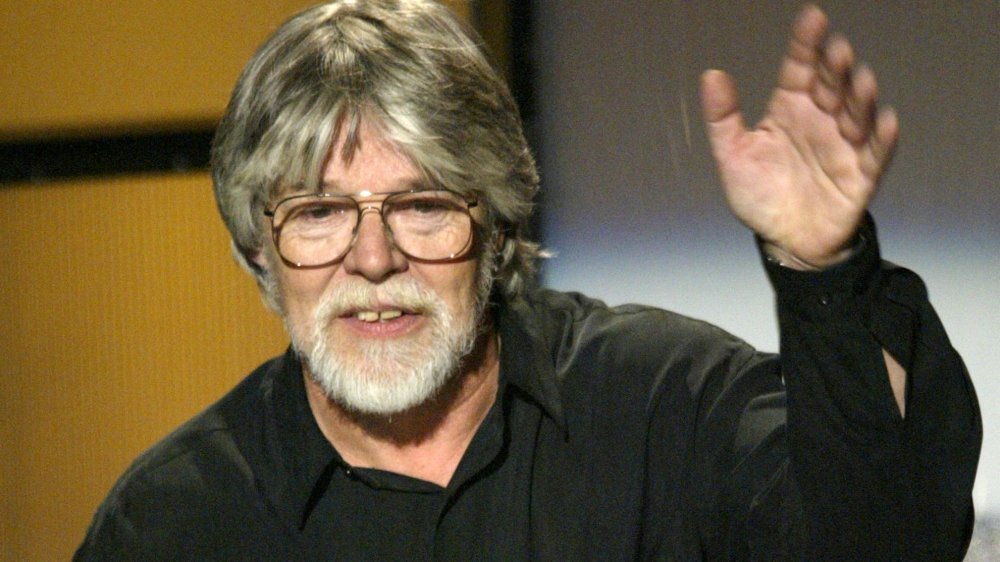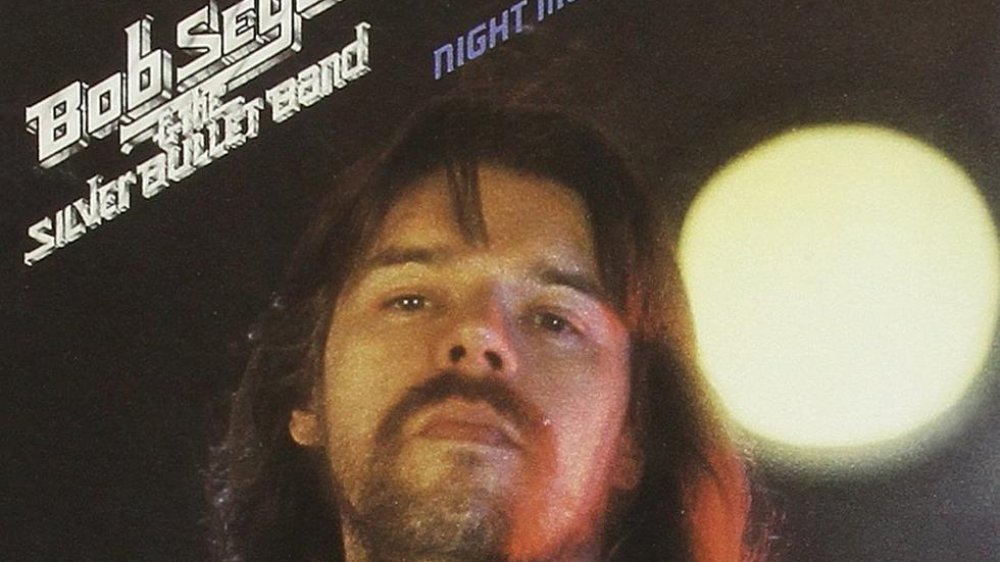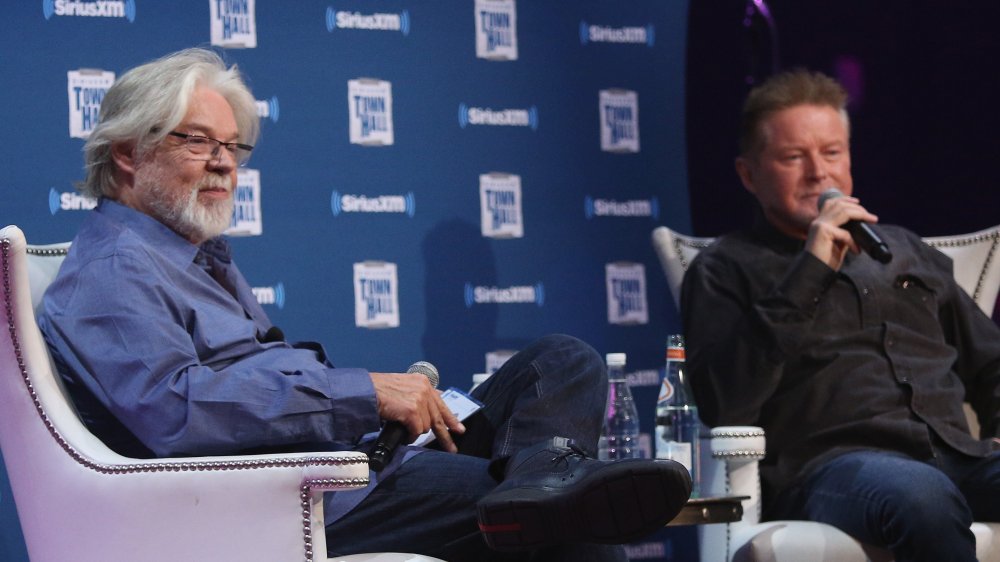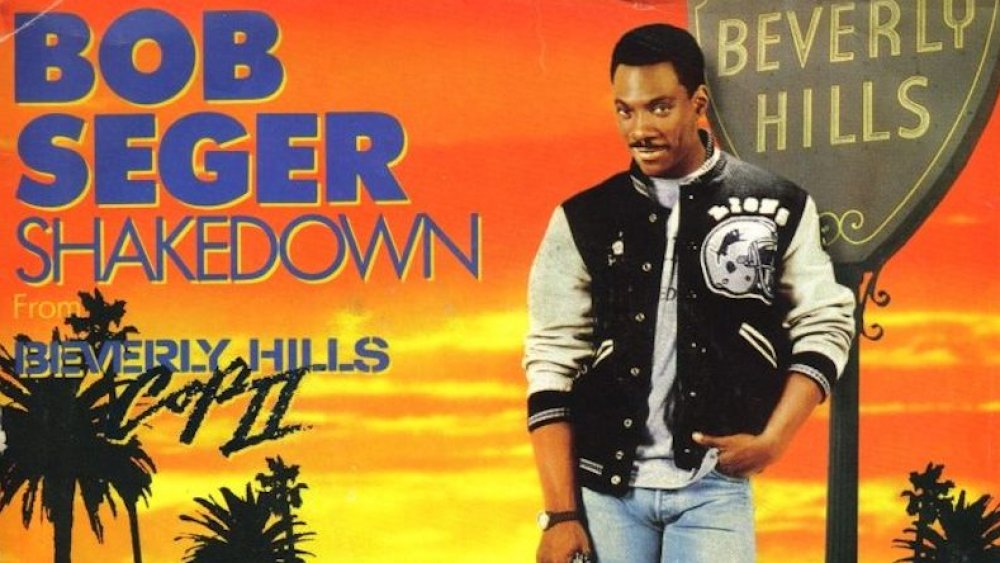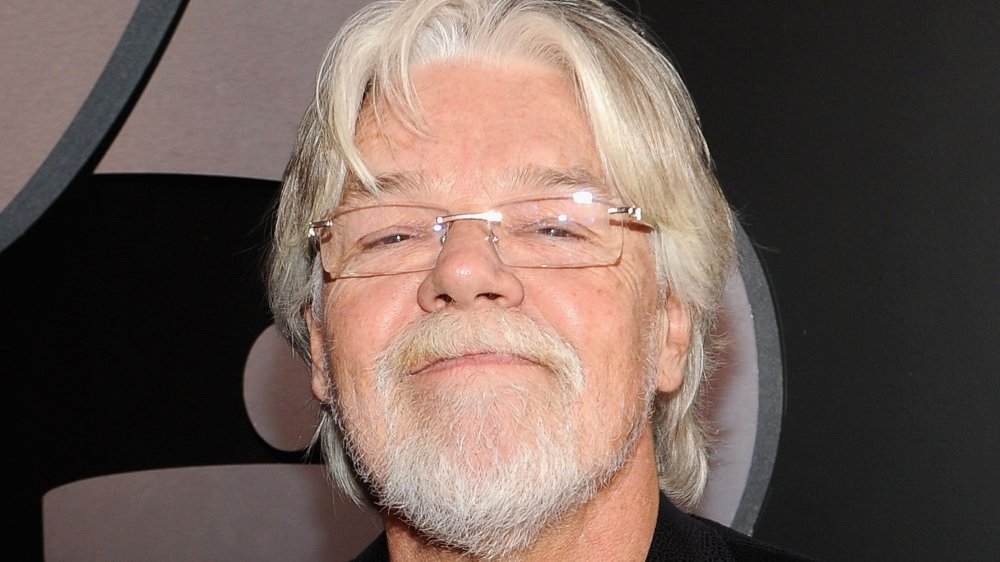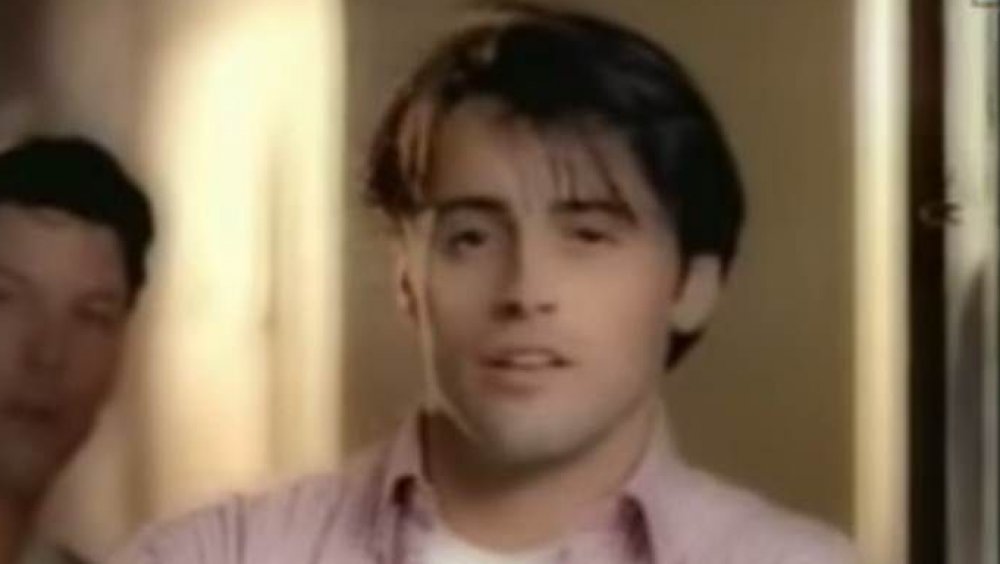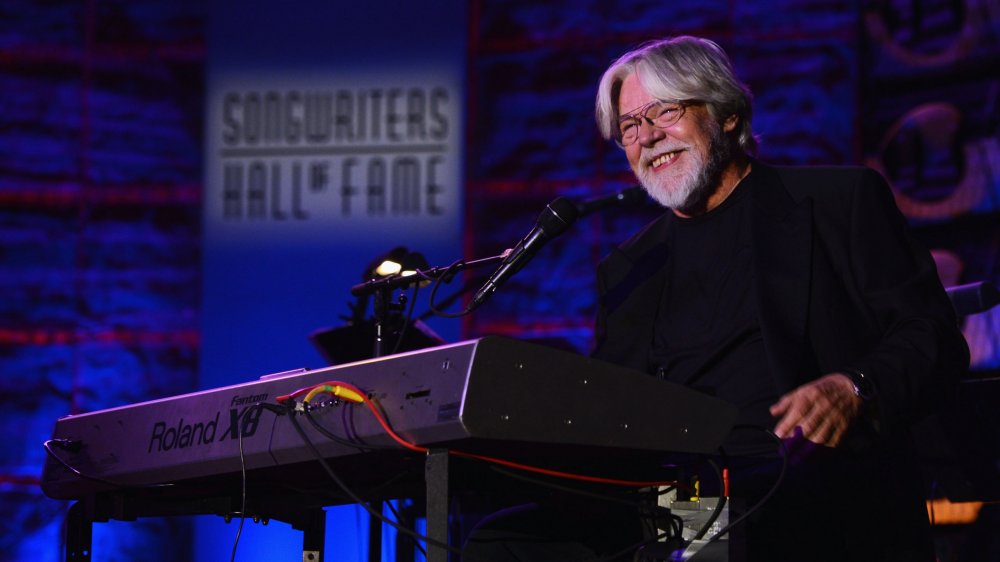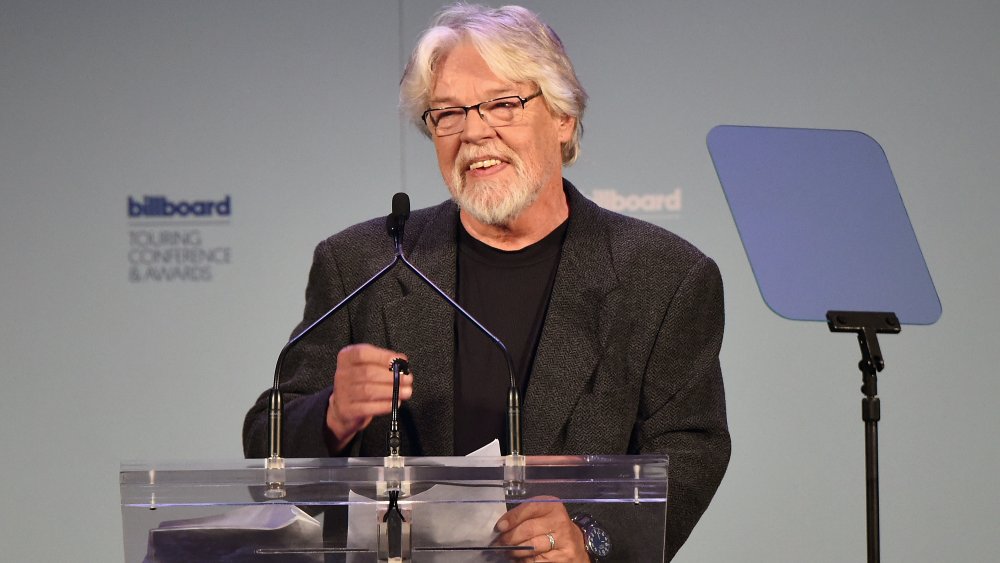The Untold Truth Of Bob Seger
In retrospect, the musical landscape of the 1970s feels like it was dominated by disco acts like the Bee Gees and the smooth California soft rock sound of Fleetwood Mac. That's true, but don't sleep on Bob Seger or his skilled and loyal Silver Bullet Band. The Michigan native was a major force in rock 'n' roll in the 1970s, and he wrote, recorded, and endlessly toured songs most everyone could like.
Seger was a master of arena rock anthems and songs about teenage love, producing a catalog that kept him a radio mainstay into the '80s, '90s, and beyond. His particular style of deep-throated, bluesy, old time rock 'n' roll — we're talking songs like "Hollywood Nights," "Still the Same," "Turn the Page," and of course, "Old Time Rock and Roll" — make a case for Seger and his band as one of the most definitive acts in rock history.
Seger plugged away with his guitar for more than 50 years, but there's more to the man than his hit songs. From his athletic background to the real reason he retired, there's a whole lot of untold truth about Bob Seger, and today, w'ere looking at some of the stories you might not know about the definitive heartland rocker.
Bob Seger was young, strong, and running against the wind
Most people contain multitudes. They're good at more than just one thing, or they're at least interested in a variety of things. And that's true for Bob Seger. In addition to being a skilled and talented enough musician to earn a very robust living from it for decades, he's also a lifelong athlete and competitor. Back in high school in Michigan, he really wanted to play football — specifically the glorious position of quarterback. But he couldn't cut it on the gridiron, leading him to turn to track and field instead. His years of hoofing it as fast as he could inspired one of his most notable songs. "I always wanted to write a song about being a runner," he told The Mercury News. "I don't think anybody got that, but that's where the 'Against the Wind' title came from."
Seger races against the wind not just on land but on the sea, too. In 2001, his sailboat Lightning won the 2001 Port Huron-to-Mackinac Sailboat Race in Michigan. Seger is a hands-on owner, too. "Everybody took turns steering the boat, and he was in the rotation just like everybody else," Lightning crew member Mike Thompson told a boating publication.
The Silver Bullet Band was not his first group
While still a teenager in high school in the early 1960s, Bob Seger cut his musical teeth as both a guitarist and vocalist in a number of Detroit-area bands. His first real group was a trio called the Decibels, where he played alongside Eddie Andrews, who'd later manage Seger's career in his major rock star years.
After moving to Ann Arbor, Michigan, Seger joined a band called the Town Criers, then switched teams again to play with Doug Brown and the Omens. In that group, Seger — who's so strongly associated with the guitar — played keyboards. After a name change to the mildly humorous Beach Bums, the group released a single called "The Ballad of the Yellow Beret," a parody of Staff Sgt. Barry Sadler's 1966 ultra-patriotic #1 hit "The Ballad of the Green Berets." Seger's version mocked Vietnam War-era draft dodgers, and it could've been at least a local hit had Sadler not threatened to sue, forcing the record to be pulled out of stores.
Later in 1966, Seger went solo, scoring some Michigan hits with "East Side Story" and "Heavy Music," only for label Cameo Records to go out of business. After a brief sojourn to college, Seger returned to music in 1969 and redoubled his efforts to make it big.
A national one-hit wonder and a local legend at the same time
While almost universally considered a "1970s" act, Bob Seger scored his first hit in early 1969. "Ramblin' Gamblin' Man," attributed to the Bob Seger System, hit #17 on the Billboard pop chart. But that didn't quite solidify Seger's mainstream success or national stature. Under his own name and with his bands, Seger kept releasing singles and albums throughout the early 1970s to very little attention. He was essentially a one-hit wonder, as "Ramblin' Gamblin' Man" was the singer's only top 40 hit until "Night Moves" moved into the top five in 1976.
From that point on, he was a hit machine around the country and the world, the way'd he been in some parts of the Midwest for years. For while he was a relatively obscure act for most Americans in the early '70s, Seger was a superstar in his home state of Michigan. In the same week in 1976 that he played to a handful of people in a random Chicago bar, he took the stage in front of 76,000 screaming and appreciative fans at the Pontiac Silverdome outside Detroit.
How he worked on his 'Night Moves'
Perhaps the reason why Bob Seger's songs have resonated with so many people and for so long is because they're authentic. Tunes like "Night Moves" feel so emotionally real because they are, as the singer-songwriter pulled from real-life events to craft his compositions.
For example, according to an interview with In the Studio with Redbeard, Seger really got to work on his "night moves" with a "dark-haired Italian girl" that he dated when he was 19, and "she was one year older" than the singer. According to the Encyclopedia of Great Popular Song Recordings, the woman was named Rene Andretti, Seger's first real girlfriend as a teenager. But the romance, while monumental in the life of young Seger, ultimately proved ill-fated. "Her boyfriend was in the service, and when he came back, she married him," he told the Detroit Free Press. "My first broken heart." Fortunately, Seger moved on — he's been married to his third wife, Nita Dorricott, since 1993. And hey, we got "Night Moves" out of the whole experience, so it ended well for everyone.
He helped the Eagles soar
The Eagles were one of the most popular bands of the '70s, and its country-influenced sound was synonymous with the decade. The group was also a supergroup, packed with individually successful performers and songwriters such as Don Henley, Joe Walsh, and Glenn Frey. Despite that rock 'n' roll braintrust, the band grew utterly stumped when working on an out-of-character, hard-rocking stomper of a song for its 1979 album The Long Run.
According to Eagle guitarist Don Felder, when the band realized that Frey's vocals were underrepresented on the album, Frey, Henley, and collaborator J.D. Souther forged a nugget of a song, an uptempo, hand clap-driven number. There was one problem, though. They couldn't come up with a chorus. And that's when Frey decided to seek outside help in the form of another '70s rock star, Bob Seger. Frey called him on the phone and sang what he and the other Eagles had come up with, all the way up to where the chorus should go. From out of thin air, Seger pulled out the melody of that chorus, and subsequently, the title of the song: "There's gonna be a heartache tonight, a heartache tonight, I know." The result, of course, was "Heartache Tonight," with Seger as a credited co-writer, and the song went on to become the fifth (and final) #1 hit for Eagles.
Bob Seger, king of the eight-track
Bob Seger, like John Mellencamp or Bruce Springsteen, has often presented himself as a voice of the common man — those blue collar, working class individuals who, like Seger, come from a humble Midwestern background. That's a big reason why he allowed his song "Like a Rock" to be used for years in commercials for American-made Chevrolet trucks, and it's an attitude that prompted him to make a relatively bizarre request of his record label.
The eight-track tape exploded in popularity in the late 1960s and 1970s, and it was superior to vinyl records in at least one regard. Music was portable on the compact tapes, and automakers responded by outfitting cars and trucks with eight-track decks. However, the more streamlined cassette eventually overtook the eight-track as the portable musical format of choice, and by 1982, record labels had pretty much phased it out. But Seger thought that was a disservice to the public. "There are thousands of fans out there who still have old eight-tracks in their pickups or RVs," Seger told People. "Times are tough. A lot of them don't have the money to get a new system." So, per Seger's behest, Capitol Records released his 1982 record The Distance on eight-track.
His biggest hit wasn't supposed to be his
While Bob Seger continued to pack arenas and stadiums into the '90s and most of his '70s hits can still be heard on any classic rock radio station today, the hit singles period of the man's career started to die out in the late '80s. However, his final top ten hit just happened to be his biggest. In 1987, he hit #1 for the first and only time with "Shakedown," his groovy, R&B-heavy contribution to the Beverly Hills Cop II soundtrack. A commercial triumph for the veteran rocker, "Shakedown" also earned Seger (who wrote the lyrics to the song, not the music) a nomination for Best Original Song at the Academy Awards. And to think — the song originally wasn't his.
Beverly Hills Cop II producers hired Eagles singer Glenn Frey, who'd had a big hit with "The Heat is On" from the first Beverly Hills Cop, to record a song for the sequel. According to The Billboard Book of Number One Hits, Frey didn't like the verse lyrics written by composers Keith Forsey and Harold Faltermeyer, and he additionally contracted laryngitis just before he was supposed to lay down vocals. Frey pulled out of the project, so MCA Records president Irving Azoff called the Eagles' old friend and collaborator Seger, asking him to both write new verse lyrics and record the song.
Bob Seger's biggest regret
Perhaps the most recognizable song in the Bob Seger catalog is "Old Time Rock and Roll," what with its iconic opening piano riff, Seger's howling vocal delivery, and a blistering saxophone solo. Scraping into the top 30 of the Billboard Hot 100 when released as a single in 1979, it became a song for the ages when used in that famous scene from the 1983 movie Risky Business, in which a young Tom Cruise dances around in his underwear.
According to uDiscoverMusic, "Old Time Rock and Roll" was almost an afterthought, recorded late in the process of making the album Stranger in Town, brought to Seger by Alabama songwriter George Jackson. Seger liked the chorus but not the verses, so he wrote those himself. However, he didn't think the song was ever going to be a single, let alone a hit, and so he didn't take action to list himself as a songwriter. That means he's missed out on untold riches in royalties. "That was the dumbest thing I ever did," Seger once said.
When Bob Seger met Joey (and tequila)
In 1994, the same year that Bob Seger released his Greatest Hits album, he also appeared in a music video for one of the record's standout tracks — "Night Moves," released nearly 20 years earlier. The video evokes the song's wistful nostalgia, shot in a dreamy soft focus and set at a drive-in movie theater sometime in the distant, heavily romanticized past. Young people mill about, flirting and getting together, with a central couple portrayed by Daphne Zuniga of Melrose Place and Matt LeBlanc, just before Friends would debut and make him a household name as ladies' man Joey Tribbiani.
Believe it or not, Seger actually did a little acting coaching. According to LeBlanc on Top Gear, Seger summoned the actor to his trailer and told him "what it was like when he was young and going to the drive-in and trying to pick up girls." And then the rocker produced a bottle of tequila. "Next thing I know," LeBlanc said, "we down a whole bottle of tequila, Bob Seger and I, and then they knock on the door, 'ready for you on set.'"
So even though both Seger and LeBlanc were in various states of drunkenness for the video, the "Night Moves" clip must've had some kind of positive effect. Bob Seger's Greatest Hits went on to sell more than 9 million copies from 2000 to 2009 alone, making it one of the decade's bestselling albums.
No streaming Seger
It's a good thing that Bob Seger's best-of collection was so readily available on compact disc, because when the streaming music revolution hit in the 2010s, his songs were nowhere to be found. For years, alongside such mega-selling acts as Def Leppard and Tool, Seger was one of the biggest no-shows on Spotify, Apple Music, Amazon Music, and other online music streaming services. At one point, the only streamable Seger songs on Spotify were his obscure Christmas cuts "Sock It to Me Santa" and "The Little Drummer Boy."
Seger's stuff finally showed up in 2017, three years after he told Rolling Stone that the egregious unavailability of his work certainly wasn't his own doing. "It's an ongoing issue with my manager and Capitol Records. You have to talk to him about that," Seger said. "They agreed to something many years ago about new media, and they don't want to live up to it." He added that he wished "people could get any song at any time." But hey, at least now we can "Turn the Page" or visit "Mainstream" anytime we like.
He had to back out because of his back
Bob Seger isn't getting any younger, and all those years of living on the road, if not just living in general, have taken their toll. According to Rolling Stone, in 2017, the year he turned 72 years old, he ruptured a disc just before he was supposed to embark on a concert tour. His doctor told him that if symptoms worsened — like if his legs started to fail — he'd have to cancel the tour and undergo surgery.
Well, Seger woke up one morning in September 2017 with a "dragging" left leg. "My doctor said to me, 'Oh no, that's it, you're done with this tour. You're having surgery now,'" Seger said. A few days later, Seger's management announced (per USA Today) that the remaining 18 dates on his 31-date tour schedule would be indefinitely postponed so the singer could attend to "an urgent medical issue concerning his vertebrae."
Bob Seger retired (again)
After his career slowed down in the 1990s, Bob Seger took a cue and quietly retired from the music business with the aim of focusing on family life. "I had kids at age 47, and very late in life, and I'd been doing it for 30 straight years, writing songs, making a record and touring and starting the process right over," he told CBS Sunday Morning. "Then I had the kids and, you know, it might be a good time to slow down and watch them grow up — you're never gonna get another chance to see it." After his 1995 album It's a Mystery, Seger didn't release an album until 2006's Face the Promise, and he toured in support of it in 2007, his first set of concert dates since 1996.
Back in the swing of things for another decade or so, Seger re-retired in 2018. Not long after canceling shows because of back problems and a subsequent surgery, Seger announced that his 2018 to 2019 "Travelin' Man Tour" would be the last time he'd hit the road.

